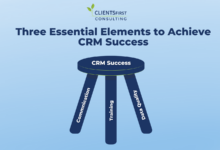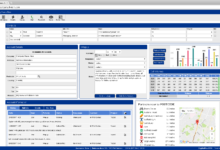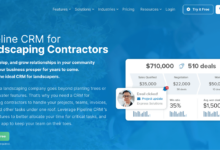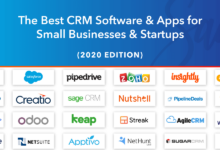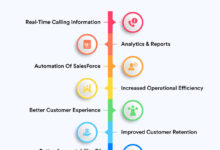Best Contractor CRM: Streamline Your Business
Best Contractor CRM software isn’t just about managing contacts; it’s about transforming how you run your contracting business. Finding the right system can mean the difference between juggling spreadsheets and effortlessly managing projects, clients, and finances. This guide dives deep into the essential features, selection factors, and future trends of contractor CRMs, helping you choose the perfect solution to boost efficiency and profitability.
We’ll explore key features like robust project management tools, seamless client communication channels, and efficient invoicing capabilities. We’ll also examine how integration with other business software, such as accounting platforms and scheduling apps, can streamline your workflow. Understanding your business size, budget, and data security needs will be crucial in making an informed decision. Ultimately, the goal is to find a CRM that not only meets your current needs but also scales with your growth.
Defining “Best” in Contractor CRM Software
Finding the “best” contractor CRM isn’t about a single magic bullet; it’s about finding the perfect fit for your specific business needs. The ideal software streamlines operations, improves client relationships, and ultimately boosts your bottom line. This means considering several key features and functionalities to determine which CRM truly excels.
A top-tier Contractor CRM goes beyond basic contact management. It needs to integrate seamlessly with your daily workflow, offering robust project management capabilities, efficient communication tools, and streamlined invoicing processes. The software should also provide insightful reporting and analytics to help you track progress, identify bottlenecks, and make data-driven decisions.
Key Features of a Top-Tier Contractor CRM
Several crucial features differentiate a good CRM from a great one for contractors. These features work together to optimize various aspects of your business, improving efficiency and profitability.
- Comprehensive Contact Management: Beyond just names and numbers, a strong CRM allows for detailed client profiles, including project history, communication logs, and payment information. This centralized data repository eliminates the need to search through scattered emails or spreadsheets.
- Robust Project Management Tools: Features like task assignment, progress tracking, deadline management, and resource allocation are essential. The ability to link tasks to specific clients and projects ensures clear accountability and simplifies project oversight.
- Streamlined Communication Features: Integrated communication tools, including email marketing, SMS messaging, and possibly even direct in-app chat, improve client engagement and project collaboration. Automated email sequences for project updates or reminders save valuable time.
- Automated Invoicing and Payment Processing: Automating invoice generation, sending, and tracking simplifies the financial side of contracting. Integration with payment gateways streamlines the payment process, reducing late payments and improving cash flow.
- Reporting and Analytics: Data-driven insights are critical for growth. A good CRM provides customizable reports on project profitability, client lifetime value, and other key metrics to inform business decisions.
Comparison of CRM Functionalities Relevant to Contractors
Different CRMs offer varying strengths in specific areas. Understanding these differences is key to choosing the right software.
| Feature | Project Management Focus | Client Communication Focus | Invoicing Focus |
|---|---|---|---|
| Software A | Excellent task management, Gantt charts, resource allocation | Basic email integration, limited client portal | Automated invoicing, basic payment tracking |
| Software B | Good task management, basic timeline view | Robust client portal, integrated chat, SMS messaging | Manual invoicing, requires third-party payment integration |
| Software C | Simple task list, limited project overview | Email integration, no client portal | Basic invoicing, no payment integration |
Importance of Integration with Other Contractor Tools
A standalone CRM is less effective than one that integrates seamlessly with other essential contractor tools. This integration eliminates data silos and streamlines workflows.
- Accounting Software Integration: Connecting your CRM to your accounting software (e.g., QuickBooks, Xero) automates data transfer between invoicing, payments, and financial reports, minimizing manual data entry and reducing errors.
- Scheduling App Integration: Integrating with scheduling apps (e.g., Calendly, Acuity Scheduling) allows clients to easily book appointments, eliminating back-and-forth emails and ensuring accurate scheduling.
- Other Integrations: Depending on your specific needs, integrations with other tools like proposal software, time tracking apps, or project collaboration platforms can further enhance efficiency.
Essential Features of a Contractor CRM
A robust Contractor CRM is more than just a contact list; it’s the central nervous system of your business, streamlining operations and boosting profitability. Choosing the right system depends heavily on understanding its core functionalities and how they translate into tangible benefits for your contracting business. Let’s delve into the essential features that separate a good CRM from a great one.
Lead Management Functionality
Effective lead management is the cornerstone of any successful contracting business. A contractor CRM should offer features that help you capture, nurture, and convert leads efficiently. This includes functionalities like lead scoring (automatically ranking leads based on pre-defined criteria), lead assignment (routing leads to the appropriate team members), and automated lead nurturing workflows (sending targeted emails or messages based on lead behavior). For example, a CRM might automatically send a thank-you email after a lead submits a contact form, followed by a series of emails showcasing relevant case studies or testimonials. This automated process significantly improves response rates and conversion rates compared to manual follow-ups. Additionally, features like customizable lead fields allow you to gather specific information relevant to your contracting needs, providing a richer understanding of each potential client.
Client Communication Strategies
A contractor CRM facilitates effective client communication through various channels, improving client satisfaction and fostering strong relationships. Features such as integrated email marketing, two-way text messaging, and even scheduling tools allow for seamless communication. For example, using the CRM, you can schedule automated reminders for upcoming appointments, send progress reports directly to clients through the platform, and quickly access past communication history for context. This centralized communication approach eliminates the confusion and delays often associated with using multiple platforms and ensures all client interactions are logged and readily accessible. Furthermore, the ability to track communication effectiveness helps identify successful strategies and refine future interactions.
Project Management Capabilities Comparison
| CRM Name | Project Tracking Features | Client Communication Tools | Reporting Capabilities |
|---|---|---|---|
| JobNimbus | Task management, progress tracking, deadline setting, file sharing, customizable workflows | Integrated email, two-way texting, client portal with project updates | Customizable reports on project profitability, time tracking, and client satisfaction |
| ServiceTitan | Detailed job scheduling, dispatching, technician tracking, inventory management | Client communication portal, automated appointment reminders, integrated texting | Comprehensive reporting on job costs, revenue, technician performance, and customer satisfaction |
| Buildertrend | Detailed project timelines, task assignments, progress photos, change order management | Client portal with project updates, document sharing, communication logs | Reports on project budgets, expenses, and profitability, along with client feedback analysis |
Selecting the Right Contractor CRM
Choosing the perfect Contractor CRM isn’t a one-size-fits-all affair. The ideal system depends heavily on your specific needs and the scale of your contracting business. Several key factors influence this decision, impacting efficiency, cost, and overall success.
Business Size and CRM Selection
The size of your contracting business significantly impacts your CRM needs. Solopreneurs or small teams might find a simple, affordable CRM sufficient, focusing on basic contact management and project tracking. These solutions often lack the advanced features and scalability required by larger enterprises. Larger contracting firms, with numerous projects, employees, and clients, require more robust CRMs offering features like advanced reporting, team collaboration tools, and integration with other business applications. For example, a small plumbing business might thrive with a simple system focusing on scheduling and client communication, while a large construction company would need a system capable of managing complex projects, budgets, and multiple teams across various sites.
Contractor CRM Pricing Models
Contractor CRMs employ various pricing models. Subscription-based models, the most common, offer different tiers with varying features and user limits. This allows businesses to scale their CRM usage as they grow. Pricing typically depends on the number of users and the features included. One-time purchase models are less prevalent, usually offering a limited feature set and lacking ongoing support and updates. Some CRMs offer a freemium model, providing basic functionality for free while charging for premium features. Choosing the right model depends on your budget, anticipated growth, and the features you need. A small business might find a freemium or low-tier subscription suitable, while a larger business may opt for a higher-tier subscription or a more comprehensive, potentially more expensive, one-time purchase if long-term cost is a priority and the software meets their current and future needs.
Data Security and Privacy in Contractor CRMs
Data security and privacy are paramount when selecting a Contractor CRM. Contractors handle sensitive client information, including addresses, financial details, and project specifics. Choosing a CRM with robust security features is crucial. Look for systems with encryption, secure authentication methods (like two-factor authentication), and regular security audits. Compliance with relevant data privacy regulations, such as GDPR or CCPA, is also essential. Understanding the CRM provider’s data security practices and their commitment to protecting client data is crucial before committing to a system. For example, verifying the CRM provider’s security certifications (like ISO 27001) and their data backup and recovery procedures can significantly reduce the risk of data loss or breaches.
Case Studies
Real-world examples showcase the transformative power of Contractor CRMs. Seeing how others have successfully implemented these systems provides valuable insights and demonstrates the potential return on investment. The following case studies illustrate the benefits across various aspects of a contracting business, from operational efficiency to enhanced client relationships.
Successful CRM Implementation at a Small Electrical Contracting Firm
Ace Electric, a small electrical contracting firm with five employees, struggled with disorganized scheduling, missed deadlines, and difficulty tracking project profitability. They implemented a cloud-based CRM with features including job scheduling, client communication tools, and project management capabilities. Within three months, Ace Electric saw a 15% increase in on-time project completion, a 10% reduction in administrative overhead, and a noticeable improvement in client communication. The CRM’s reporting features allowed them to quickly identify and address project bottlenecks, leading to improved profitability. The intuitive interface made training easy for all employees, minimizing disruption during the transition. The ability to centralize client information, including past projects and communication history, significantly streamlined project initiation and improved communication consistency.
Contrasting CRM Experiences: Two Landscaping Businesses
GreenThumb Landscaping utilized a CRM focused heavily on client relationship management, prioritizing features like automated email marketing and client feedback surveys. Their experience was marked by improved client retention rates (up 20% year-over-year) and a significant increase in positive online reviews. However, they found the project management features lacking, requiring them to supplement the CRM with a separate project management tool, adding to their overall software costs.
In contrast, Landscapes Unlimited chose a CRM with robust project management capabilities, including task assignments, progress tracking, and resource allocation. They experienced a significant improvement in project efficiency and reduced project overruns. However, their client communication suffered somewhat, as the CRM’s client communication tools were less sophisticated than GreenThumb’s system. This highlighted the importance of carefully evaluating which CRM features align most closely with a business’s specific needs and priorities.
Improved Client Satisfaction Through CRM Implementation at a Roofing Company
RoofRight, a roofing company, implemented a CRM to address consistent complaints about slow response times and a lack of clear communication during the repair process. The CRM’s automated communication features ensured clients received timely updates on project status, scheduling changes, and material deliveries. A built-in client portal allowed clients to access project documents, submit questions, and track progress independently. This resulted in a marked improvement in client satisfaction, as reflected in higher customer satisfaction surveys and fewer negative reviews. The ability to track client communication history also helped resolve issues more efficiently, leading to faster problem resolution and increased client loyalty. The transparency provided by the CRM fostered trust and improved the overall client experience.
Future Trends in Contractor CRM Technology
The contractor CRM landscape is rapidly evolving, driven by technological advancements and changing business needs. We’re seeing a shift towards more intelligent, integrated, and mobile-first solutions that promise to significantly improve efficiency and profitability for contracting businesses. This section explores key trends shaping the future of Contractor CRMs.
The Impact of AI and Machine Learning
Artificial intelligence (AI) and machine learning (ML) are poised to revolutionize Contractor CRMs. These technologies can automate repetitive tasks, predict future outcomes, and provide valuable insights to improve decision-making. For example, AI-powered CRM systems can automatically schedule appointments, generate proposals based on client data, and even predict potential project delays based on historical data and current project status. ML algorithms can analyze past performance data to identify trends and optimize resource allocation, leading to improved project profitability and reduced operational costs. Imagine a system that proactively suggests optimal staffing for a project based on the skills required and the availability of your team members – that’s the power of AI and ML in action. This level of automation frees up contractors to focus on higher-value activities, such as client relationship building and strategic planning.
Mobile Accessibility in Contractor CRMs
Mobile accessibility is no longer a luxury; it’s a necessity for modern Contractor CRMs. Contractors are often on the go, visiting job sites, meeting clients, and managing multiple projects simultaneously. A mobile-first CRM allows contractors to access crucial information, update project statuses, and communicate with clients in real-time, regardless of their location. This seamless access to data improves responsiveness, enhances collaboration, and ensures that projects stay on track. Features like mobile-optimized dashboards, offline access to critical data, and push notifications for urgent updates are becoming increasingly important for contractors to maintain productivity and efficiency. For instance, a contractor could quickly check a client’s contact details or update a project’s progress directly from the job site using a mobile CRM app, minimizing delays and enhancing client communication.
Evolution of Integration Capabilities
The future of Contractor CRMs lies in seamless integration with other essential business tools. Integration with accounting software, project management platforms, and communication tools is crucial for streamlining workflows and eliminating data silos. A well-integrated CRM allows for automatic data synchronization between different systems, reducing manual data entry and minimizing the risk of errors. For example, a Contractor CRM integrated with an accounting software could automatically update invoices and track payments, providing a complete financial overview of each project. Similarly, integration with a project management platform allows for real-time tracking of project progress, resource allocation, and task completion, enabling better oversight and control over projects. This interconnected ecosystem allows for a more holistic view of the business, facilitating better decision-making and improved overall efficiency.
Final Wrap-Up
Choosing the best contractor CRM is a strategic move that impacts every aspect of your business. By carefully considering the factors discussed – from essential features and integration capabilities to pricing models and data security – you can select a system that empowers you to manage projects more efficiently, communicate effectively with clients, and ultimately, grow your business. Remember, the right CRM is an investment in your success, paving the way for streamlined operations and increased profitability.
